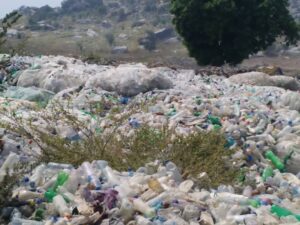From 2019 to 2021, Smart City Sweden welcomed more than 6,500 visitors from over 100 countries, helping them to learn more about Swedish sustainability solutions. Waste management, including recycling and resource recovery, was a popular topic requested from the visiting delegations.
Since 2017, Smart City Sweden has been tasked by the Swedish Government with welcoming stakeholders and decision-makers from around the world who want to learn more about Swedish sustainability solutions and their implementation. The visits have resulted in around 20 pilot studies and projects where Swedish companies have helped with technical solutions, out of which several have focused on the topics of waste management and Waste-to-Energy.
According to Aditi Bhasin, Project Manager at IVL Swedish Environmental Research Institute, who has worked with some of the pilot studies conducted as part of Smart City Sweden, the Swedish environmental technologies most in-demand in other countries are biogas solutions and combined heat and power production (cogeneration). She says that the Swedish model for cogeneration plants, which utilises the thermal energy that is always a by-product of power production, is so far fairly unique.

Aditi Bhasin, Project Manager at IVL
– I’m surprised that more countries haven’t thought of this, how an important resource is being wasted. For example, about 75 per cent of heating and cooling in the EU is generated by fossil fuels. Using waste heat will allow us to reduce our dependence on these, says Bhasin.
Smart City Sweden has started a dialogue with two major international companies to help them use waste heat from their production facilities in India.
Potential to replace imported natural gas
In Sweden, the government has decided that entities that produce biogas will receive financial aid until 2040, provided the biogas is upgraded to the same quality as natural gas. This will eventually reduce Sweden’s dependence on imported natural gas from fossil sources. Biogas can replace natural gas in industries or be used as fuel in gas-powered cars, heavy lorries and marine transports, as well as contributing to solving waste problems and providing biofertilizers for use in agriculture.
Marie Holmlund works at consultancy company WSP and has long been involved with waste management issues, primarily in Africa. Through Smart City Sweden’s pilot studies, she has investigated the potential for the local production of biogas in cities in Nigeria and Morocco.
One of the plants that have provided a model for the pilot studies is Södertörn’s biogas plant, which utilises the energy from the 50,000 tons of food waste generated every year in the County of Stockholm, Sweden. This is one-third of all the waste the inhabitants generate, and the plant can produce the equivalent of 8.8 million litres of petrol and 14,000 tons of biofertilizer every year.
– Biogas has amazing potential. Poorer countries always have local waste that is simply piled up, which can cause sanitary problems or pose a danger to groundwater. Local production of biogas also leads to improved energy security, and creates jobs and opportunities for transforming the local transport system, says Holmlund.
She points out that almost all urban areas can access substrate (organic material) that can be made into biogas, such as sewerage, food waste, or fish waste in ports.
More towns and villages could use household food waste for producing biogas, but this means the food waste must be separated. Sweden has a national target that, by 2023, at least 75 per cent of all food waste from households, catering kitchens, shops and restaurants will be separated and biologically treated so that nutrients and biogas are utilised. Only one of Sweden’s municipalities currently achieves this, but 87 per cent of Sweden’s municipalities already collect food waste separately, and expansion continues.
Increased recycling to reduce waste to landfill
There are also other types of recycling solutions in Sweden. Aditi Bhasin says that recycling plants are one solution that can have a huge influence on greenhouse gas emissions and contribute to a more circular economy.
One project for improving waste management has started in Karu, Nigeria, through Smart City Sweden, for which Marie Holmlund and a local company, Natural Eco Capital Limited, evaluated how the region could increase recycling and reduce the amount of waste that went to landfill.

Plastic waste in Nigeria
– We can currently recycle about 1,000 kilos of plastic waste every day. With the support of our partners, we are planning to expand our recycling activities during 2022, to over 5,000 kg per day, says Obioria Okoye, founder and partner in Blackaion Capital which, along with Beacon Energy Development Services Limited and the Nasarawa State Government, established the Karu Integrated Waste Management Company (KIWMC).
Investing in training and education has proven to be extremely important for work in establishing recycling plants.
– Our biggest challenge is the lack of understanding of the various technologies that can be used for treating plastic waste. Another challenge is the lack of capacity and understanding from the state government about how to provide effective support for recycling activities, says Okoye.
IVL Swedish Environmental Research Institute has provided help to KIWMC, for example with ensuring that the recycled products achieve the desired quality, guaranteeing long-term supplies and maintaining quality standards.
– WSP and IVL were decisive and offered training for our operative team and for the state. This helped enormously with the understanding of the waste management options and the available technologies, says Okoye.
Aditi Bhasin says that public-private partnerships are an important element in projects being realised.
– When the state provides financing, things often move slowly. In some cases, it is faster when there are private investors. At the same time, you must have the state on your side, and it has a big role to play in projects like these. A combination is best, Bhasin concludes.
Are you looking for waste solutions in your city? Book your visit to Smart City Sweden here.